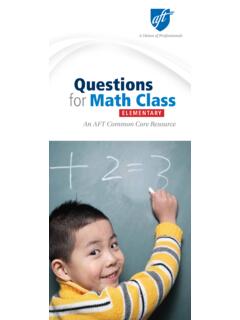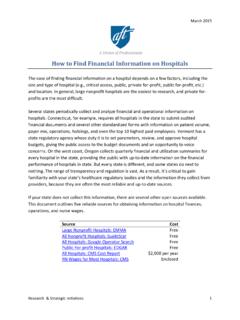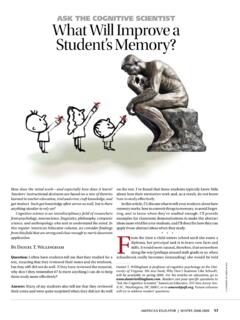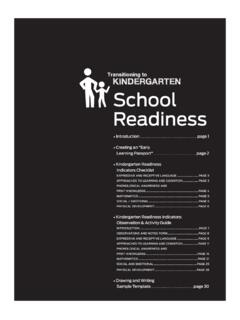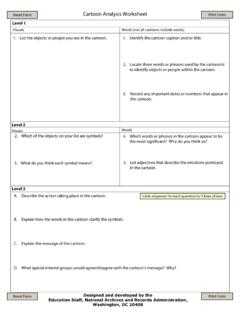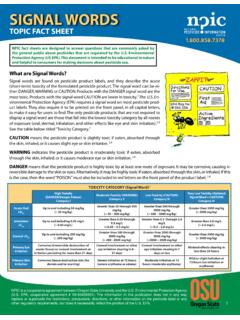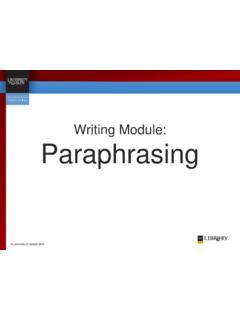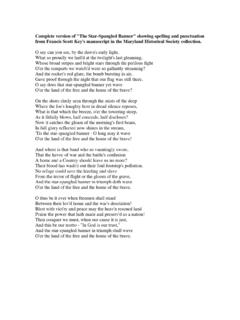Transcription of How Spelling Supports Reading - American Federation of ...
1 Much about Spelling is puzzling. Our society expectsthat any educated person can spell, yet literate adultscommonly characterize themselves as poor spellersand make Spelling mistakes. Many children have troublespelling, but we do not know how many, or in relation to whatstandard, because state accountability assessments seldom in-clude a direct measure ofspelling competence. Few state stan-dards specify what, exactly, a student at each grade level shouldbe able to spell, and most subsume Spelling under broad topicssuch as written composition and language proficiency.
2 Statewriting tests may not even score children on Spelling accuracy,as they prefer to lump it in with other mechanical skills inthe scoring , research has shown that learning to spell andlearning to read rely on much of the same underlying knowl-edge such as the relationships between letters and sounds and, not surprisingly, that Spelling instruction can be designedto help children better understand that key knowledge, result-ing in better Reading (Ehri, 2000). Catherine Snow et al.(2005, p. 86) summarize the real importance of Spelling forreading as follows: Spelling and Reading build and rely on thesame mental representation of a word.
3 Knowing the Spelling ofa word makes the representation of it sturdy and accessible forfluent Reading . In fact, Ehri and Snowling (2004) found thatthe ability to read words by sight ( automatically) rests onthe ability to map letters and letter combinations to words are not very visually distinctive (for example,car,can,cane), it is impossible for children to memorize morethan a fewdozen words unless they have developed insightsinto how letters and sounds correspond. Learning to spell re-quires instruction and gradual integration of informationabout print, speech sounds, and meaning these, in turn, sup-port memory for whole words , which is used in both spellingand sight Reading .
4 Research also bears out a strong relationship betweenspelling and writing: Writers who must think too hard abouthow to spell use up valuable cognitive resources needed forhigher level aspects of composition (Singer and Bashir, 2004).Even more than Reading , writing is a mental juggling act thatdepends on automatic deployment of basic skills such as hand-writing, Spelling , grammar, and punctuation so that the writercan keep track of such concerns as topic, organization, wordchoice, and audience needs.
5 Poor spellers may restrict whatthey write to words they can spell, with inevitable loss of ver-bal power, or they may lose track of their thoughts when theyget stuck trying to spell a what about spell check? Since the advent of word pro-cessing and spell checkers, some educators have argued thatspelling instruction is unnecessary. It s true that spell checkerswork reasonably well for those of us who can spell reasonablywell but rudimentary Spelling skills are insufficient to use aspell checker.
6 Spell checkers do not catch all errors. Studentswho are very poor spellers do not produce the close approxi-mations of target words necessary for the spell checker to sug-gest the right word. In fact, one study (Montgomery, Karlan,and Coutinho, 2001) reported that spell checkers usually catchjust 30 to 80 percent of misspellings overall (partly becausethey miss errors like herevs. hear), and that spell checkers iden-tified the target word from the misspellings of students withlearning disabilities only 53 percent of the , the research base for claiming that Spelling is impor-tant for youngchildren is solid: Learning to spell enhanceschildren s Reading and writing.
7 But what about middle-schoolstudents? Does continued Spelling instruction offer any addedbenefits? Here the research is sparse indeed. Yet, the nature ofthe English language s Spelling /writing system provides reasonto believe that there would be significant benefits to older stu-12 American EDUCATORWINTER 2005/06 How Spelling Supports ReadingAnd Why It Is More Regular and Predictable Than You May ThinkBy Louisa C. MoatsLouisa C. Moats is advisor on literacy research and professional de-velopment for Sopris West Educational Services.
8 She developed Lan-guage Essentials for Teachers of Reading and Spelling , a profes-sional development program for teachers, and Spellography, aspelling curriculum for children in grades 4 through 6. She haswritten several books and reports, including the AFT s TeachingReading IsRocket Scienceand Speech to Print: Language Essen-tials for Teachers. This is her fourth article for American from allocating a small amount of time to continued,appropriate Spelling instruction. In addition to continuing tolearn the rules of Spelling , students can develop a deep under-standing of English by studying the meanings of roots, pre-fixes, and suffixes; families of related words ; the historical de-velopment of the English language; and words language oforigin.
9 It s very likely that this sort of word study (in additionto being intrinsically interesting to many students) would sup-port vocabulary development and facilitate Reading by en-abling students to view any new word from the angles ofsound, meaning, language of origin, and syntax. As a result,students would be more likely to be able to figure out the newword s meaning as well as how to spell it and how to use itwith precision. Those of us who can spell reasonably well take forgranted the role that Spelling plays in daily life.
10 Filingalphabetically; looking up words in a phone book, dic-tionary, or thesaurus; recognizing the right choice from the pos-sibilities presented by a spell checker; writing notes that otherscan read and even playing parlor games are all dependenton Spelling . In a literate society, conventional Spelling is ex-pected and anything beyond a few small errors is equated withignorance and incompetence. In fact, the National Commis-sion on Writing for America s Families, Schools, and Colleges(2005) reported that 80 percent of the time an employment ap-plication is doomed if it is poorly written or poorly spelled.
